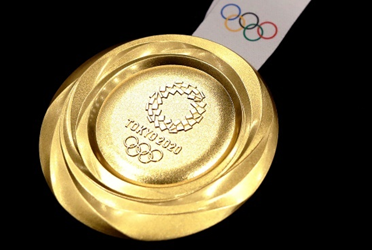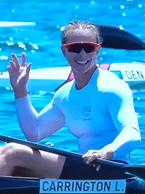The Tokyo Diaries – 3rd August
0What day for Lisa Carrington – and it may not be over yet. She kicked off the day with a comprehensive win in her K1 200m semi-final, creating a new Olympic best in the process. She then paired up with Caitlin Regal in the K2 500m semi-final and, you guessed it, had a comfortable win and a new Olympic best. In the other semi-final, Teneale Hatton and Alicia Hoskin were a long way off the pace, finishing last.
Then, it was time for a couple of Gold Medals, as Carrington romped home in the K1 200m final ahead of Spain’s Teresa Portela and Denmark’s Emma Jorgensen. A quick trip to the podium, and she was back in the water with Caitlin Regal to take out the Gold in the K2 500m final, ahead of a gritty effort from Poland and Hungary. You may struggle to believe this, but both Gold Medals were secured in Olympic Best times, securing Carrington’s spot as one of New Zealander’s greatest Olympians.
Earlier in the morning, the heats were on in the Men’s 1500m. New Zealand’s Sam Tanner avoided a lot of the carnage in Heat 2, finishing a reasonably creditable 9th, however, failed to make the semi-finals. Wily veteran Nick Willis was next up, and having watched the other races unfold, decided to get out at the front of the pack as quickly as possible to avoid tussling for position. It was a smart move as he hung on for 7th, and the 38-year-old had done enough to make the semi-finals, as he did for the first time 17 years agon in Athens.
Anton Down-Jenkins kept things simple again in the Men’s 3m Springboard Diving, looking to execute les complicated dives more effectively, but losing points for difficulty. In doing so, he did enough in the semi-finals to make the cut for the final, ultimately finishing 8th in a wonderful performance. In both rounds he kept a 3.4 dive up his sleeve, executing both very well. Whether he can now take that confidence into future programmes will be interesting to see.
Heavyweight boxer David Nyika’s run came to an end compliments of Russian fighter Muslim Gadzhimagomedov, leaving the Kiwi with a Bronze medal. It was a terrific fight, worthy of a final, which was 4:1 on the cards. The Russian just had a little more accuracy and found his range a little better, but Nyika was gutsy in response. He can be proud of his tournament, probably his last as an amateur.
Blair Tuke and Peter Burling were third pretty much the whole way in their final 49er race. The GBR team started strongly and led at the first two marks but fell behind to Germany at the third. From there it was neck and neck down the last leg until the GBR team just pulled away by about a metre. Finn sailor Josh Junior went into the medal race with a chance to finish on the podium, and in a topsy turvy race he was at one point third on both the water and the standings. But he was swamped in the run home and finished eighth on the day, and fifth overall. My thanks to sailing correspondent @MadMaclegend who watched so I didn’t have to.
In the quarter finals of the Women’s Water Polo, the USA were the much more fancied team over Canada. At 11-3 at half time, it was easy to see why, and it seemed like a thrashing was on the cards. But Canada fought back in a goalless third quarter, and ultimately limited the damage to 16-5.
Off to the velodrome. The Women’s Team Pursuit managed 6th in qualifying, coming up against Australia. After a tense battle they lost out and went on to fight for 7th and 8th with the French, who were (just) too good. The Italians Men’s Team Pursuit team smashed the World Record in beating New Zealand in the semi-final, who were only 0.090secs behind in an incredible race. There was total carnage in the second semi-final as the Danes were hampered by a GBR rider and crashed out. However, they have been reinstated for the Gold medal race, with Australia now taking on New Zealand for Bronze.
The New Zealand Men’s Sprint Team qualified 5th, but the best they could manage was a 7th place finish, beating Poland along the way after a desperate loss to the French at the quarter finals stage.
Simone Biles made her way back into competition and managed to pick up the Bronze in the Beam. She was beaten to Gold and Silver by China’s Chenchen Guan and Xijing Tang respectively.
At the Olympic Stadium, there was drama in the Women’s Long Jump, where the last three jumps of the competition effectively dictated terms. Germany’s Malaika Mihambo jumped a season’s best 7.00m to take the Gold from the USA’s Brittney Reese and Nigeria’s Ese Brume – both jumping 3cm less. It was a tense and action-packed watch.
Norway’s Karsten Warholm absolutely smashed his own 400m Hurdles World Record in winning Gold in 45.94 secs. Not far away was Rai Benjamin (USA) and Alison Dos Santos in Silver and Bronze respectively.
There was just enough time to catch the Bouldering section of the Sport Climbing event, and what fantastic viewing it was too. Power, agility and guile were all on offer, and it made for some very tense moments. This sport has a real future at the Olympics. Therefore, watch the IOC drop it for Tiddlywinks in 2028.
Off to the field for the last two events of the night, and what a bizarre evening. Tom Walsh put the shot well on three attempts, but for reasons only known to the incompetent official on hand, was red flagged on all three occasions. He challenged two of them, and ultimately went through as top qualifier in Pool A with his final effort of 21.49m. In Pool B, Jacko Gill did well to also make it through to the final with a 20.97m. Hopefully the official with the flag is given the night off for the final.
The Women’s Hammer event was won, unsurprisingly, by Polish World Record Holder Anita Wlodarczyk from Chinese athlete Zheng Wang and fellow Pole Malwina Kopron. There was a fine performance from New Zealander Julia Ratcliffe, who threw consistently well throughout the competition in finishing 9th.
Follow Keith on Twitter.
You can find more on the Tokyo Diaries, here.



